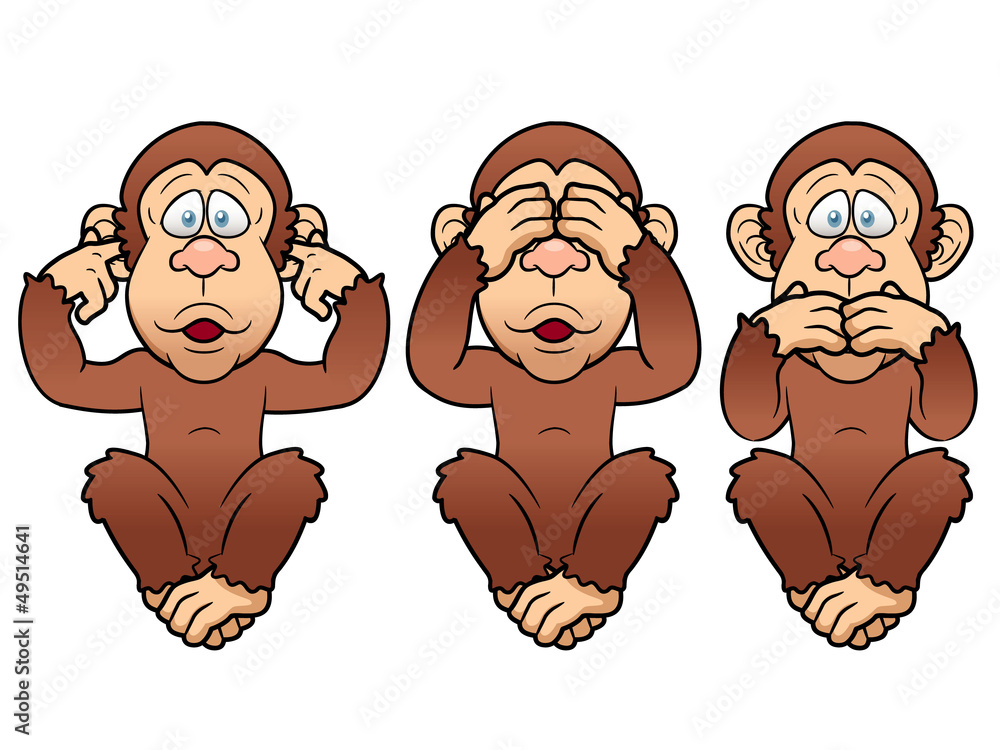The Enduring Power of the See No Evil Hear No Evil Cartoon
We’ve all seen them—those three mischievous monkeys, each with a paw playfully covering their eyes, ears, or mouth. They're cute, a little bit goofy, and instantly recognizable. But these aren’t just any cartoon monkeys; they embody a proverb that’s been whispered through centuries and across cultures: “See no evil, hear no evil, speak no evil.” But how did these simple primates become such potent symbols, and what is it about them that continues to resonate with us today?
Imagine a world before viral videos and instant news updates, a time when proverbs and folklore served as the primary vehicles for passing down wisdom and warnings. The "see no evil, hear no evil, speak no evil" maxim likely emerged from this world, its origins shrouded in the mists of time. Some trace it back to ancient China, while others point to similar adages in ancient Greece or India. Regardless of its precise birthplace, the proverb, often linked to the concept of moral responsibility, took root in various cultures, evolving and adapting along the way.
It was in Japan, however, that the proverb found its most enduring visual representation. In the 17th century, the three wise monkeys, known as the "Three Wise Monkeys" or "Three Mystic Apes" (though they are technically macaques), were carved into the doors of the Tōshō-gū Shrine in Nikkō. These carvings, brimming with personality and infused with symbolic meaning, catapulted the proverb into the public consciousness, turning it into a universally understood image.
But the journey of the three monkeys didn’t stop there. Their inherent charm and the proverb's timeless message proved irresistible to artists, writers, and satirists alike. The 20th century witnessed an explosion of the see no evil hear no evil cartoon, with the monkeys gracing everything from editorial cartoons to animated shorts. They became cultural chameleons, adapting to the changing times and lending themselves to a wide array of interpretations—from lighthearted humor to biting social commentary.
Perhaps the enduring power of the see no evil hear no evil cartoon lies in its simplicity. The image is direct, immediate, and universally understood. We instinctively grasp the message: by consciously choosing to ignore wrongdoing, we become complicit in it. This simple yet profound idea transcends language and cultural barriers, making it just as relevant today as it was centuries ago.
But the proverb, and its cartoon counterparts, are not without their critics. Some argue that the message promotes a culture of silence and apathy, encouraging people to turn a blind eye to injustice. Others point out that true morality involves actively confronting evil, not merely ignoring it. This debate, simmering for centuries, highlights the complexity of the proverb and its interpretations. It reminds us that true wisdom often lies not in blind obedience to a maxim but in grappling with its nuances and applying it thoughtfully to the complexities of our lives.
Advantages and Disadvantages of the "See No Evil, Hear No Evil, Speak No Evil" Philosophy
| Advantages | Disadvantages |
|---|---|
| Promotes peace and harmony by avoiding gossip and negativity | Can lead to inaction in the face of injustice or wrongdoing |
| Encourages personal accountability for one's own actions and words | May be used to silence dissent or suppress important conversations |
| Offers a simple yet powerful reminder to be mindful of what we consume and share | Can be misconstrued as a justification for ignorance or willful blindness |
While the see no evil hear no evil cartoon may have started as a simple proverb, its journey through history has been anything but straightforward. It has been celebrated, debated, satirized, and reinterpreted, reflecting the ever-evolving complexities of human morality. And as we navigate an increasingly interconnected and often overwhelming world, perhaps those three mischievous monkeys, forever frozen in their playful poses, still have something valuable to teach us about the choices we make and the responsibility we bear to ourselves and to each other.
Saying goodbye with grace crafting a memorable farewell message to your team
Unlock your entertainment mediacom channel lineup in columbia mo
Groove with wellness exploring hippie online stores for your wellness needs














